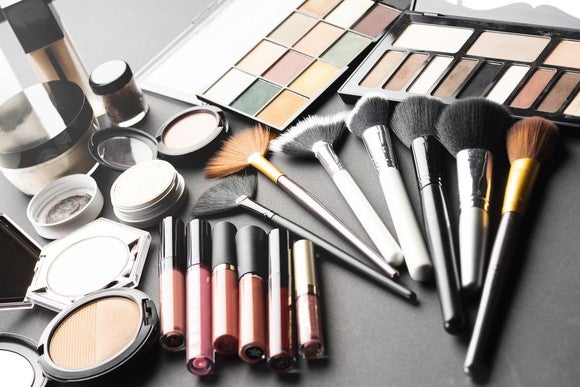Ulta Beauty (ULTA 0.25%) recently announced fourth-quarter earnings results that ended its fiscal year on a positive note. Sales growth sped up during the holiday shopping period despite the weak demand for makeup products across the industry. The retailer's wider 2019 was marked by a few struggles, though, including slowing customer traffic gains and reduced profitability.
In a conference call with Wall Street analysts last week, CEO Mary Dillon and her team discussed those hits and misses while giving the most detailed outlook possible for a 2020 year that's likely to include significant sales pressures from the COVID-19 outbreak.
Below are a few highlights from the conference call.

Image source: Getty Images.
Finishing the year strong
"We knew the fourth quarter would be challenging given both the category headwinds in makeup and the fact that we are lapping a very strong fourth quarter last year," Dillon said, "but our enhanced omnichannel capabilities combined with our merchandise exclusives and cross-category marketing events helped us deliver a successful quarter."
Ulta's 4% sales boost was at the high end of management's early December forecast and constituted a growth rebound when compared with the prior quarter. Executives said successful initiatives like its Ulta Beauty Fest promotion helped keep customer traffic rising in stores. The chain also benefited from a strong merchandising plan and a 30% spike in online sales.
Ulta stood out from its retailing peers during the quarter, which is a testament to its operating model. "We increased market share across all major beauty categories," Dillon said.
Soft spots in the earnings report
"We expected to be more promotional in the quarter to offset the headwinds we're experiencing in the color cosmetics category, and did indeed implement incremental promotions," CFO Scott Settersten said.
Looking deeper into the results reveals a few stubborn growth challenges. Ulta noted a continued decline in its core makeup category, which fell to 48% of the total sales base from 51%, as that industry niche contracted.
The company offset most of the slump with better sales in areas like skincare and fragrances, but earnings were still pressured by the sales shift and by investments in the e-commerce segment. Overall, the operating margin fell for the third straight year, landing at 12.1% compared with its high of 13.5% in 2017.
Looking ahead to 2020
"While we are investing at a lower pace in 2020 than we did in 2019," Settersten said, "we expect that investments to support international expansion, personalization, digital store of the future, and other IT capabilities will result in about 60 basis points of [selling, general, and administrative] headwind in 2020."
The 2020 outlook is weak on both the top and bottom lines, with comps expected to slow again as operating margin ticks down for a fourth straight year. In the context of a shrinking industry, though, that result would mean Ulta is still strengthening its hold on the beauty retailing niche. The profitability drop is mainly coming from management's choice to invest in growth areas like its loyalty program and the international expansion into Canada. Its core retailing business is strong, as demonstrated by Ulta's robust customer traffic growth over the holiday season.
The outlook doesn't reflect any potential disruption to supply or demand tied to the novel coronavirus pandemic, which recent retail closings all but ensure. For now, Ulta's priority is to keep customers and employees healthy and safe while supporting more social distancing. To that end, the consumer staples giant has suspended its physical retailing offerings in the U.S and is only relying on its e-commerce business at least through the end of March.






